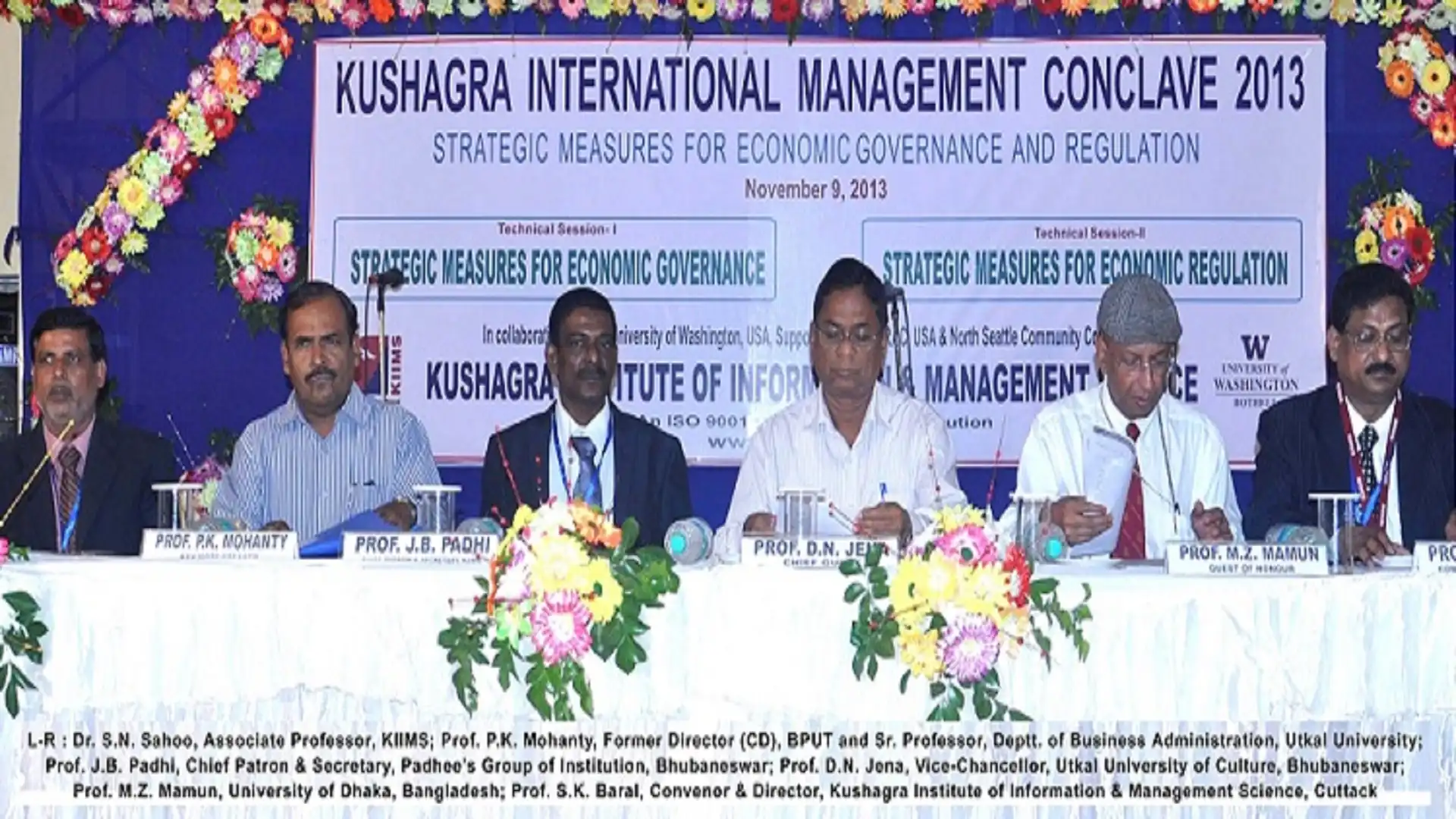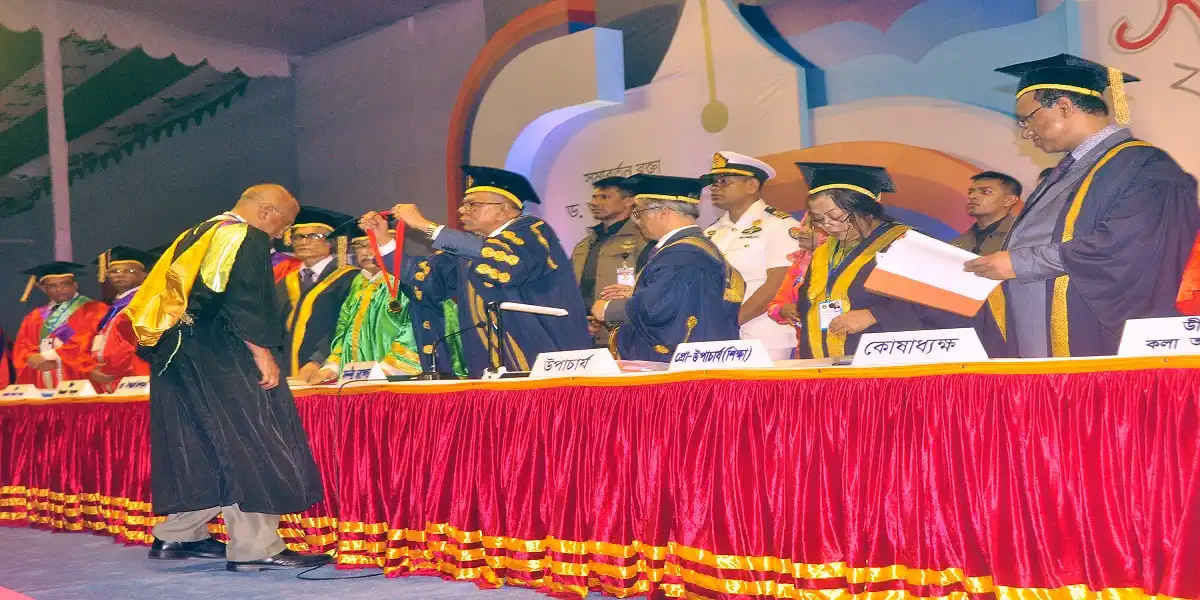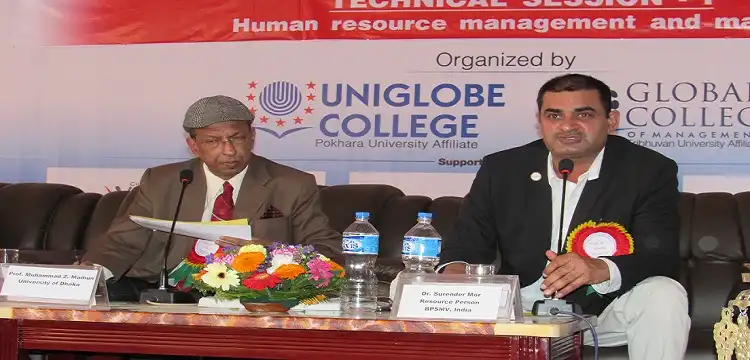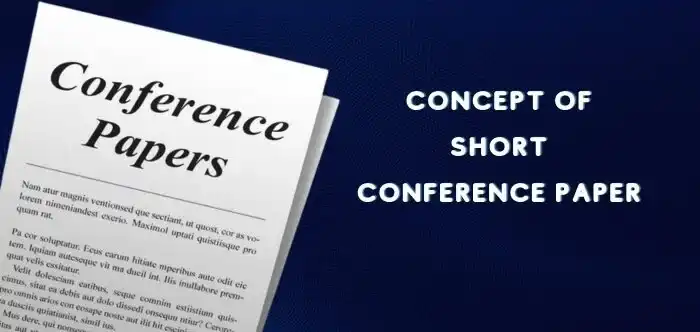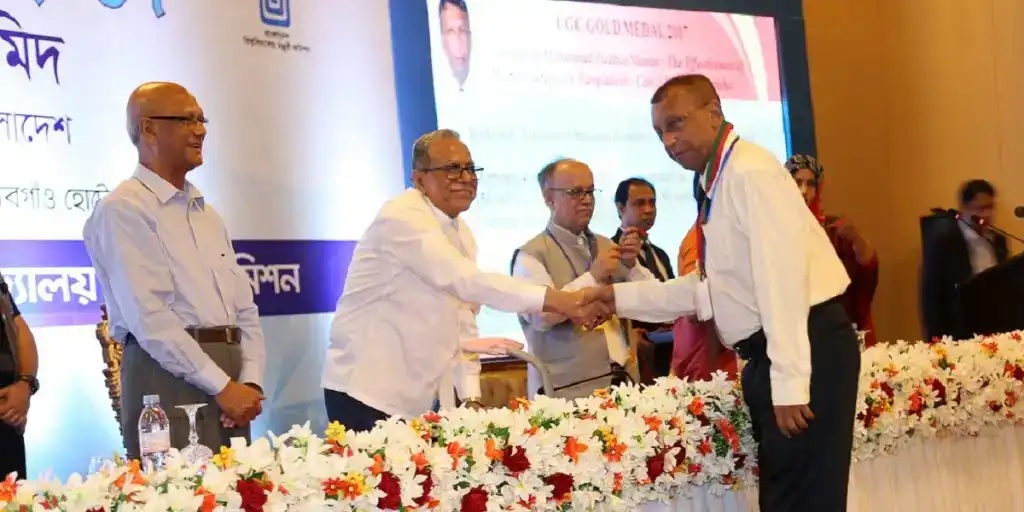
Paper Abstract
Insurance Journal, Volume:69, December 2024, ISSN: 1684-0437, pp 5-25, Bangladesh Insurence Academy.
FACTORS AFFECTING THE LIFE INSURANCE MARKETING IN BANGLADESH: EXECUTIVES’ PERSPECTIVE
The life insurance industry in Bangladesh has shown rapid growth in recent decades. Even then the life insurance penetration is very low. With the aim of expanding and improving the industry and availing themselves of the market opportunity several companies have started emphasizing their marketing strategies. The study looked at the perspectives of executives in life insurance companies regarding the various factors that affect the growth of the industry. The survey is conducted on 48 executives employed in the life insurance companies in Bangladesh. A structured questionnaire in a five-point Likert scale is used focusing 32 simple variables grouped into four categories to gauge the respondent managers’ views. The respondents are picked by non-probability sampling. The study made use of face validity. The items measured are found internally consistent and reliable. Both descriptive and inferential statistical tools are used in analysis. The study noted that for effective progress of the industry education level, smooth service delivery, better living standard, political stability, product choice, stakeholders’ awareness, and B2C communication are vital. In addition, better socioeconomic conditions, people’s positive mind set, diversifying products, positive people perception, and targeted B2B communication are important. On the other hand, promotion frequency, product nature, and policy pricing are found to be less important attributes. Other important factors that may affect the growth of the industry are value offering, physical distribution, consumer research, budget, innovation, promotions, print media, media choice, legal restrictions, TV ads, promotional messages, digital penetration, and physical evidence. The companies, policy makers and regulators can play an important role in implication of the specific findings.
Key phrases: Environmental factors, Marketing communication and channels, Marketing mix, Personal/Psychological attributes.
INTERNATIONAL JOURNAL OF RESEARCH AND INNOVATION IN SOCIAL SCIENCE (IJRISS)
ISSN No. 2454-6186 | DOI: 10.47772/IJRISS |Volume VIII Issue IIIS March 2024 | Special Issue on Education
University Students’ Perception of Quality: A Case of Bangladesh
This paper explored the quality perception of university students of Bangladesh in terms of 57 quality dimensions. A total of 258 responses from both public and private universities with different demographics are considered using non-probability convenient sampling technique. The responses are found reliable and valid. The most important quality dimensions observed by the respondents are value for money, completeness, privacy, serviceability, performance, durability, accurate quantity, reliability, taste, sound, easy identification, and conformance. The very close to highly agreed attributes are quality certification, ease of use, responsiveness, timeliness, hygienic/cleanliness, accuracy, easy installation, competency, and accessibility and convenience. On the other hand, the least agreed quality dimensions as perceived by the respondents are appealing facilities, packaging/look, prestige, financial facilities, foreign good, advertisement, loyalty program, financially sound brand, CSR, celebrity endorsement.
Of the 29 quality attributes of goods, the study identified good value, performance, serviceability, durability, reliability, sound, easy identification, conformance, taste, ease of use, easy set-up as the most important quality dimensions. Interestingly the students give less emphasis on natural and cognitive based quality attributes. On the other hand, of the 18 service quality attributes, the respondents found completeness, accuracy, cleanliness, timeliness, responsiveness, and accessibility & convenience as most important quality attributes. Further, of the ten quality constructs common to both service and manufacturing items the respondents identified privacy of information and quality certification as the most important. On the other extreme the least agreeable attributes are financially sound companies, CSR activity, and celebrity endorsement. Demography and ideography wise no significant difference is observed in the study.
Key words: Cognition-based quality, Manufacturing quality, Natural quality, Service quality.
The International Review of Financial Consumers, Volume.8 Issue.2(December, 2023), 21-35 pISSN 2508-3155 eISSN 2508-464X, https://doi.org/10.36544/irfc.2023.8-2.2ⓒ 2023 International Academy of Financial Consumers
Financial Impact of COVID-19 on the Livelihood of Urban Poor: A Study
This research explored urban slum dwellers’ financial repercussions during COVID-19 in Bangladesh. The study
investigated financial implications using 51 attributes grouped in seven categories related to work/jobs, wage/earning,
stakeholders, savings/expenditure/debt, food, family well-being, and offspring. The study noted that during Covid-19
households are affected in almost all the attributes and areas. Notable attributes are surpassed expenditure over
income, more spending, no more saving, spending from savings, more spending due to commodity price hikes,
reduced income due to lockdown, reduced other income-generating activities, difficulty in payment of utility and
other bills, extra fare to reach workplaces, more spending on transportation, failure to repay loans, family members
living without required medical care/services, and work scarcity. Financial implications related to savings, expenses,
and debt are the highest concern for the slum dwellers, followed by family well-being, work/job, wage/income,
and stakeholder related financial implications. Least impacted implications are food and offspring related. Overall,
Covid-19 ruthlessly impacted the financial wellbeing of the households responding to this survey.
Universal Library of Business and Economics, ISSN: 3064-9951 | Volume 2, Issue 3, Open Access | PP: 13-27, DOI: https://doi.org/10.70315/uloap.ulbec.2025.0203003
Cardiac Patients’ Perception of Healthcare Services in Hospitals of Bangladesh
This study explored the perception of cardiac patients about cardiac healthcare services in hospitals of Dhaka, Bangladesh. The study has identified 22 health care service facilities applicable for cardiac hospitals. As noted, the patients are overall satisfied with the facilities but with a varied degree. The most satisfied facilities are i) continuous power supply, ii) clean medical wards, iii) doctors’ explanation to the patient & their family, iv) simple and user-friendly paper works, v) timely service, vi) Doctors availability, vii) adequate security system, viii) availability of stretchers/wheelchairs. The moderately satisfied facilities include i) reliable doctors, ii) accurate laboratory test results, iii) good ventilation of the rooms/medical wards, iv) quick admission and provision of bed, vi) prompt emergency services, vii) constant supervision in the ICU, viii) food quality, ix) friendly & cooperative nurses, x) reasonable treatment cost, xi) friendly support staff, xii) nurses availability, xiii) reliable nurses. The least satisfied facility is found to be i) the hospital’s supply of medicine and other items. The patients agreed that the hospital where they are treated can be recommended to others. Hence it can be said that the cardiac hospitals in Bangladesh are taking good care of their patients and giving reliable services.
International Journal of Research and Innovation in Social Science (IJRISS), Vol. VII, Issue VII, pp. 129-149, ISSN No. 2454-6186, DOI: https://dx.doi.org/10.47772/IJRISS.2023.70709, Published: 25 July 2023.
Urban Women Entrepreneurship Development in Bangladesh: Challenges and Preparations
Muhammad Ziaulhaq Mamun
Professor & Pro-Vice Chancellor, East West University, Bangladesh & former Professor, IBA, University of Dhaka, Bangladesh. Email: mzmamun@ewubd.edu, mzmamun@yahoo.com.
andProfessor, IBA, University of Dhaka, Bangladesh
ABSTRACT
This study examines the challenges faced by urban women entrepreneurs in Bangladesh and explores the preparations necessary for their development. Interviews were conducted with 95 urban women entrepreneurs from various backgrounds and business ownership. The research found that personal challenges, such as financial constraints and work-life balance, were prominent among the respondents. The entrepreneurs received significant support from their families but faced limitations in terms of financing options. Limited knowledge about external financing and a lack of promotional funds and marketing knowledge were also observed. Additionally, the study revealed that entrepreneurs lacked a set business plan and faced difficulties in maintaining day-to-day business operations. The societal outlook and the lack of legal, technical, and networking support were identified as barriers to their growth. The research suggests that increased exposure and awareness of business preparations, managerial practices, project planning, and financial planning can better equip urban women entrepreneurs to expand their businesses.
Keywords: business environment, business management, financial constraints, personal challenges, societal view.
DGCCS’s Journal of Commerce, Vol. IX, No. 1, April 2022, pp. 15-33, ISSN 0973-5925, Year of publication 2022.
PROBLEMS FACED BY ONLINE JOB SITES IN BANGLADESH: MANAGERS VIEW
Muhammad Ziaulhaq Mamun
Professor & Pro-Vice Chancellor, East West University, Bangladesh & former Professor, IBA, University of Dhaka, Bangladesh.
Email: Email: mzh.mamun@gmail.com, mzmamun@yahoo.com
andLecturer, East West University, Bangladesh
ABSTRACT
This paper delves into the problems the job portals are facing in Bangladesh. Using a non-probabilistic, convenience sampling, 43 managers across 10 job portals were identified and surveyed. The study recognized 17 major problems obstructing the growth and prosperity of job sites in Bangladesh. Out of these, 5 are internal problems, namely: low revenue, lack of IT experts, insufficient promotional budget, lack of ATL promotion, lack of BTL promotion. It was no surprise when the respondents revealed that lack of promotional budget is a colossal problem for them which results in zero ATL promotion. The 12 external problems identified are poor internet access in rural areas, low bandwidth, high cost of internet connectivity, low government job postings in job portals, lack of sufficient and appropriate training facilities for IT specialists, lack of awareness of job portals among job applicants, lack of awareness of job portals among employers, user unfamiliarity with the online interface, lack of trust on the part of job applicants, lack of trust on the part of employers, IT specialists’ better career opportunities abroad. Overall, the most crucial problems are the infrastructure and problems related to the market condition. Key phrases: External, infrastructure, internal, internet access, IT experts, market.
Keywords: External, infrastructure, internal, internet access, IT experts, market condition, promotion
The International Review of Financial Consumers, Vol. 7, Issue 1, April 2022, pp. 1-18, ISSN (print) 2508-3155, ISSN (electronic) 2508-464X, http://doi.org/10.36544/ifrc.2022.7-1.1, Year of publication 2022.
MICROFINANCE EFFECT ON BORROWERS' POVERTY - A CASE STUDY ON BRAC
Muhammad Ziaulhaq Mamun
Professor & Pro-Vice Chancellor, East West University, Bangladesh & former Professor, IBA, University of Dhaka, Bangladesh.
Email: mzh.mamun@gmail.com, mzmamun@yahoo.com
andFaculty of Industrial Management, Universiti Malaysia Pahang, Pahang, Malaysia, Email: pss18001@stdmail.ump.edu.my
ABSTRACT
Many parts of the world have been suffering with poverty and some are in extreme form. Microfinance is addressed as an instrument for accelerating financial access to the poor for alleviating their poverty as mentioned in the foremost sustainable development goal. This effort has been operationalized in Bangladesh through BRAC - a prime operator for poverty alleviation. BRAC has presently serving many marginal poor below the poverty level globally. On the onset, governments and donor backed microfinance programs presumed its welfare effect on poverty. However, mixed effects are visible in separate studies that held microfinance effect doubtful. This paper is designed to assess the microfinance effect on BRAC borrowers’ poverty at business, household, individual, and security levels. The effect has been measured by regressing microfinance on borrowers’ poverty using the Household Economic Portfolio Model (HEPM). The results show that microfinance has a significant positive effect on BRAC borrowers’ poverty in each of the levels reflected by sixteen different items. Hence, microfinance may appear an efficient and effective instrument as a development tool to alleviate poverty.
Keywords: BRAC, Borrowers, HEPM Model, Household, Individual, Microfinance, Poverty, Security
BUFT Journal of Business & Economics (BJBE), Volume 3, 2022, pp. 319-335, ISSN 2664-9942 (Print), URL: https://buft.edu.bd/page/bjbe_journal, Year of publication 2022.
Users’ Perception of Herbal Medicine in Bangladesh
Muhammad Ziaulhaq Mamun
Professor & Pro-Vice Chancellor, East West University, Bangladesh & former Professor, IBA, University of Dhaka, Bangladesh.
Email: mzh.mamun@gmail.com, mzmamun@yahoo.com
ABSTRACT
Purpose: The research studied the users‟ perception regarding different aspects of herbal medicine in Bangladesh. It provides the popularity, availability and affectivity of herbal medicine that would benefit both the consumer and the manufacturer.
Methodology: The empirical study made use of primary data collected through a structured questionnaire that measured users‟ perception regarding 19 specific aspects of herbal medicines. By using convenient sampling technique 157 herbal medicine users are interviewed.
Findings: The study noted that the herbal medicine users prefer herbal medicine over other medicines, believed to use it in future, refer herbal medicine to others, and use it for chronic diseases. They witnessed that the herbal medicine has fewer side effects, made of natural ingredients, and is comparatively cheaper. They noted that the herbal products are easily available and accessible. They happily use it for common diseases and feel that the medicines should be available in public pharmacies. The users opined that the herbal medicine meet their expectations, makes fast recovery, as well as content with the knowledge of the practitioners.
Practical Implications: The research gave insight about the marketability, popularity, and customer retention regarding herbal medicine. The overall positive perception signifies an opportunity for the marketers of herbal medicine in Bangladesh.
Originality: Herbal medicine is a globally recognized medication formula. The practice of herbal medicine in Bangladesh is deeply rooted, consistent with our culture, and has flourished vastly. This study is a value-addition in this field.
Limitations: The absence of sample frame made it a little difficult to choose the respondents. Also, accessibility is a problem in the study.
Keywords: Accessibility and Convenience, Comparative Advantage, Customer Retention, Satisfaction, Usage.
Insurance Journal, Bangladesh Insurance Academy, Volume 66, pp. 05-26, ISSN 1684-0437, URL: www.bia.gov.bd, December 2021, Year of publication 2021
ISSUES OF MICRO-INSURANCE IN BANGLADESH: Policy Holders View
Muhammad Ziaulhaq Mamun
Professor & Pro-Vice Chancellor, East West University, Bangladesh & former Professor, IBA, University of Dhaka, Bangladesh.
Email: mzh.mamun@gmail.com, mzmamun@yahoo.com
ABSTACT
Micro-insurance is mainly destined to risk protection for the low-income people on life, health, livestock, and agricultural products for a very low premium. This paper investigated the micro-insurance subscribers’ perception on different issues through a structured questionnaire survey with 48 policy holders using convenience and judgmental sampling. The study showed that the subscribers are not happy about the field workers irregular field visit. The premium paid by the subscribers is found to be quite affordable and without much barrier they pay the premium regularly. But the subscribers believe that the compensation is not sufficient, and the processing time is significantly dissatisfying to them. The field and office workers’ activities showed a little insignificant dissatisfaction. The study noted that the insurance companies do not update the policy related issues to the subscribers. Overall, the respondents are a little negative towards company activities.
The respondents’ education and income noted to be strongly correlated, but no significant relationship is found between the income and premium payment. But moderate negative relationship is observed between education and premium payment justifying that more educated consciously adopt policies that require less premium. This low negative correlation between education and compensation received can be justified as more educated consciously adopt policies that require less premium; hence they receive less compensation. Very strong correlation between office distance and premium and compensation may be due to field agents focus more on distant subscribers. Quite logically very strong significant correlation is observed between premium paid, and compensation received. Regularity of field visit by the agents, regular compensation payment and better awareness program and update can improve the scenario in this respect.
Key words: compensation, customer satisfaction, micro-insurance, office distance, premium, personnel efficiency
Technium Social Sciences Journal, Vol. 21, pp. 728-764, July 2021, ISSN: 2668-7798, URL: www.techniumscience.com, DOI: https://doi.org/10.47577/tssj.v21i1.3797, Year of publication 2021
SLUM DWELLERS’ PERCEPTION ABOUT COVID-19: A STUDY IN DHAKA METROPOLIS SLUMS
Kaniz Fatima
Senior Lecturer, East West University, Bangladesh
kfs@ewubd.edu
and
Muhammad Ziaulhaq Mamun
Professor & Pro-Vice Chancellor, East West University, Bangladesh & former Professor, IBA, University of Dhaka, Bangladesh. Email: mzmamun@ewubd.edu, mzmamun@yahoo.com
ABSTACT
This research explored Dhaka slum dwellers’ (n=434) using convenience, quota, and judgmental sampling) view about COVID-19, its causes, preventive measures, potential high-risk groups, self-awareness, transmission prevention, orthodox beliefs, and vaccine effectiveness using 56 simple variables grouped in eight complex variables. The slum dwellers viewed COVID-19 as a fatal and chronic disease spread by Chinese. They perceive that direct contact with infected persons, cough and sneeze droplets, and physical proximity cause the disease. Regarding preventive measures, they think that they must wear masks, frequently wash hands, face, and feet, use soap or hand sanitizer to wash hands. They assume that hot water gargle, more lime/lemon intake, sunlight exposure, and physical activities can reduce the risk of infection. They also perceive that people of any age bear the risk of contagion; but asthmatic, heart and diabetic patients fall in the high-risk group.
The slum people self-protect covering nose and mouth while sneeze and cough, take precaution if tested positive, and maintain social distance. They take this disease seriously, as such, they wear masks, avoid guests, friends, and mass transports. They subscribed that if affected they will be in self-quarantine and follow prescribed movement and lockdown decisions to prevent transmission. They believe that home quarantine is for the infected persons only. Slum residents are found to recognize preventive mechanism and self-awareness tactics; but they are carried away by some religious beliefs like the disease is Allah’s will, a curse from Allah, results of our misdeeds, and Allah will save COVID-affected people. Because of their doubt of vaccine effectiveness, they are not quite confident about taking vaccine. Overall, the respondents do not think that they are risk-free. It is found that some of their views are not factual, like COVID-19 is a chronic disease, spread by Chinese; sunrays, hot water gargle reduces risks; lime/lemon intake prevent the disease; or diabetic, asthmatic, and heart patients are at more risks.
It is noted that most of the perceptional differences are observed with family types. Nuclear family respondents believe that cold weather causes it and perceive strongly that asthmatic patients are more susceptible to infection. They perceive similar risk of being affected if exposed to a diseased person; however, infected elderly people with comorbidities are more prone to serious illness. They blindly perceive that COVID-19 is all Allah’s will. Education wise, the participants differ in their opinion in almost all the variables. Female slum members firmly believe that Chinese has brought the disease; but males are noted to be more self-aware than females. Married slum residents strongly believe that sunlight exposure and physical activities can prevent the disease and hold the misconception that COVID-19 is a curse from Allah and results of all our misdeeds. Irrespective of their literacy level all respondents believe that Allah will save COVID-affected people. Further, occupation-wise slum dwellers have similar viewpoint about preventing the disease and curbing community transmission.
Slum residents’ opinion related to causes of the disease and vaccination has no association with age and income. Older slum residents are found to be more self-aware and cautious in limiting disease transmission, although they possess stronger orthodox religious views and more dubious about vaccination. Slum dwellers’ perception to several aspects of COVID-19 are noticed to be weakly positively related with income, indicating that even when the relatively higher income groups retain views closer to reality, their tendency to be conscious and abide by protective mechanism to reduce risk and control spread of the disease is less as opposed to insolvent slum inhabitants. The factor analysis has found that the grouping variables and the factor variables are quite consistent. It is noted that “self-awareness” and “risk reduction” are the most important factors followed by perception regarding COVID-19 vaccine. In short, slum dwellers are not observed to have a very clear idea about COVID-19, its causes, prevention mechanism, etc. They are aware of some methods of self-protection and deterrence of transmission. However, it is to be ensured that they strictly follow the methods to protect themselves and avoid community spread of the disease.
Keywords: Chronic, COVID-19, Fatality, Prevention, Risk reduction, Self-awareness, Slum, Transmission, Vaccine.
Archives of Business Research, Vol., 9, No. 11, pp. 154–176. November 2021, DOI: https://doi.org/10.14738/abr.911.11273. ISSN 2054-7404, Year of publication 2021
Effectiveness of SMS Advertising in Bangladesh: Drawing on Hierarchy of Effects Model
Muhammad Ziaulhaq Mamun
Professor & Pro-Vice Chancellor, East West University, Bangladesh & former Professor, IBA, University of Dhaka, Bangladesh.
Email: mzh.mamun@gmail.com, mzmamun@yahoo.com
ABSTRACT
The study explored the effectiveness of Short Message Service (SMS) advertising on customers’ purchase decision focusing awareness, knowledge, liking, preference, conviction, and purchase attributes of Hierarchy of Effects Model. A total of 180 mobile phone subscribers were surveyed adopting non-probability convenience and judgmental sampling techniques through a structured questionnaire. It is found that none of the attributes have positive impact on the subscribers’ behavior. Purchase is found to be the most ineffective attribute followed by Conviction and Liking. Awareness, Knowledge, and Preference are least ineffective ones. However, SMS ad which explicitly mentions the company name and offers in the title, somewhat gets subscribers’ attention. It is noted that the SMS ads do not provide enough information, accessibility, and convenience. Brand loyalty and brand image of the products advertised have weak positive impact on consumer preference. The respondents view SMS ads mostly unconvincing and ineffective; but call rate packages, internet purchases and product discount purchases fared not so poorly. However, there are situations where SMS can be utilized effectively. As SMS advertising do not really incur much additional cost for the telecom companies, it can provide an avenue for information dissemination, as well as, to generate revenue from offers they promote.
Key words: awareness, conviction, knowledge, liking, preference, purchase
International Journal of Research and Innovation in Social Science (IJRISS), Volume V, Issue VII, July 2021, pp. 715-726, ISSN 2454-6186, URL: www.rsisinternational.org, Year of publication 2021
Financial Performance of General Insurance Companies in Bangladesh: A 2003-2020 Evaluation
Muhammad Ziaulhaq Mamun
Professor & Pro-Vice Chancellor, East West University, Bangladesh & former Professor, IBA, University of Dhaka, Bangladesh.
Email: mzh.mamun@gmail.com, mzmamun@yahoo.com
and
Fairuz Chowdhury
Assistant Professor Institute of Business Administration University of Dhaka, Bangladesh
fairuz@iba-du.edu
ABSTRACT
This paper analyzed the financial performance of the general insurance companies of Bangladesh over the period 2003-2020 by studying 18 general insurance companies out of 46 (including the only government owned company Sadharan Bima Corporation, SBC). In terms of net premium, the study found no definite industry trends; but the only nationalized insurance company (SBC) has around 1200% higher premium earnings than the private average. Also, SBC has the highest figures for both investment and investment income for the studied period. Average investment increased in the private insurance sector steadily during 2003-2007, then onward there was sharp ups and downs; but SBC’s investment growth has been steady all through. In the studied period, the net claims of most private insurance companies have increased significantly with an overall rising trend. SBC has been incurring the most net claims and its average is 2543.18% more than private insurance companies’ average.
Regarding APBT (annual profit before tax), SBC had a much higher figure than any of the private companies and is almost 1200% of the average of the private general insurance companies. ROTA for most of the companies is consistent throughout the studied years. The companies had their highest ROTA during 2008-2010. The average of the private insurances showed much more fluctuation than SBC. The study found very strong correlation between industry net premium and net claims. But majority of the sample companies depict a negative correlation between profit and share price. The study further noted that older companies were financially better off compared to the newly established companies. Also, among the private general insurance companies there is variability in performance. SBC, being the only public insurance company, has a lot of upper hand. Overall, it can be said that the general insurance sector is doing moderately well.
Key words: APBT, investment, investment income, net claim, net income, ROTA
Prestige International Journal of Management & IT-Sanchayan, Vol. 10, Issue 1, 2021, pp. 1-25, ISSN 2277-1689 (Print), 2278 - 8441 (Online), Year of publication 2021
QUALITY OF EDUCATION AND VALUE FOR MONEY IN PRIVATE BUSINESS SCHOOLS OF BANGLADESH: Students’ Perception
Muhammad Ziaulhaq Mamun
Professor & Pro-Vice Chancellor, East West University, Bangladesh & former Professor, IBA, University of Dhaka, Bangladesh.
Email: mzh.mamun@gmail.com, mzmamun@yahoo.com
and
Melita Mehjabeen
Professor, IBA, University of Dhaka, Bangladesh
Email: melitamehjabeen@gmail.com
ABSTRACT
This research studied the students’ perception regarding the quality of education and value for money in private business schools in Bangladesh. A questionnaire including 42 distinct areas of student sensitivity clustered into 6 groups designed in a five-point Likert scale is used. The findings show that broadly the students are more satisfied with general, administrative & registry, and faculty resources. They are found least satisfied with financial offerings. In the areas of placement, career & perceived quality; academic, research & educational services; and facilities their satisfaction level is low and similar. Specifically, the respondents are satisfied with air-conditioning facilities, classroom cleanliness, classroom space, on-time registrations, education & communication skills of the faculty members, class schedules, and make-up classes. But the respondents are not much satisfied with transport, dormitory, recreation, and gym facilities. They are found indifferent to further study from the same university they studied. Overall, the respondents are found not receiving adequate value for their money. This study indicates that the private business schools should focus more on research and development facilities enabling the students to continue further education. The research open scope to investigate quality of education in private business schools in developing necessary skills for employability.
Keywords: classroom facilities, faculty credentials, placement, perceived quality, research, tuition
International Journal of Latest Trends in Engineering and Technology, Vol.19, Issue 4, pp.001-018, DOI: http://dx.doi.org/10.21172/1.194.01, e-ISSN:2278-621X, Year of publication 2021
SERVICE QUALITY OF INTERCITY BUS AND RAIL TRANSPORTATION IN BANGLADESH: TWO DISTINCTIVE POPULATION STUDY
Muhammad Ziaulhaq Mamun
Professor & Pro-Vice Chancellor, East West University, Bangladesh & former Professor, IBA, University of Dhaka, Bangladesh. Email: mzmamun@ewubd.edu, mzmamun@yahoo.com
ABSTRACT
The study of the commuters’ perception about service quality of road and rail transports revealed that buses need to discourage their drivers from speeding and reckless driving. Restroom facilities in stoppages and clean surrounding are ways to improve the bus services. Unaccounted passenger pickups, illegal goods trafficking should be stopped, and security should be ensured for the passengers. Bus companies need to maintain timely departure and arrival. Proper carriage of delicate goods and seats for disadvantaged can improve the bus service. However, the buses are found better in pre-purchase of tickets, tickets availability, service providers’ accessibility, information about vehicle time and short waiting time for ticket purchase. On the other hand, areas of improvement in trains are controlling travel of un-ticketed passengers, preventing carriage of smuggled goods, stopping black market of tickets, stopping hijacking/mugging, and arranging seats for disadvantaged. Improving environment, restroom facilities, toilet cleanliness need to be improved for better service delivery. Lack of courtesy and cordial greeting of the passengers are causes of concern for passengers. Maintaining scheduled arrival and departure should be closely monitored. However, the trains are found better in careful driving, information availability, less vehicle breakdown, good ventilation, less accidents, better cooling facility and good lighting.
Key phrases: Courtesy, Environment, Illegal activity, Operational efficiency, Physical facilities
Insurance Journal, Bangladesh Insurance Academy, Volume 65, pp. 73-94, ISSN 1684-0437, URL: www.bia.gov.bd, December 2021, Year of publication 2020
BORROWERS’ PERSPECTIVE OF MICRO FINANCING INSTITUTIONS (MFI) AND TRADITIONAL MONEY LENDING (TML) IN BANGLADESH: A COMPARATIVE ANALYSIS
Muhammad Ziaulhaq Mamun
Professor & Pro-Vice Chancellor, East West University, Bangladesh & former Professor, IBA, University of Dhaka, Bangladesh. Email: mzmamun@ewubd.edu, mzmamun@yahoo.com
&
Neaz Ahmed
Former Professor, Institute of Business Administration
University of Dhaka, Bangladesh
neaz@iba-bd.edu
ABSTRACT
The comparative analysis between services of TML and MFIs in Bangladesh noted that the MFIs are positively contributing to employment generation, living standard, household income and education. The limited collateral free MFI loans are not as easily available as TML. Mortgage of wealth and its forfeiting is more common in TML. The MFI loan taking has started under the influence of its mass promotion, but still the clients follow the suit of their ancestors’ TML loan taking. The initial screening procedures for MFI loans are strict, objective, and stringent. Clients take TML loans for the sake of continuity and procedural lenience even if those are linked with stern collaterals. In terms of repayment policies MFI and TML are not much different; but regarding alternative repayment and loan security TML is more apathetic, harsh, inconsiderate and on occasion cruel on default clients. Regarding sustainability, it is found that MFI clients are comparatively doing better in business.
About
Dr. Muhammad Z Mamun did his Bachelor in Civil Engineering (Bangladesh University of Engineering and Technology, Dhaka), and Master of Business Administration (MBA).
CV HIGH LIGHTS
Pro-Vice Chancellor & Professor East West University Bangladesh ( More )
VIRTUAL CONTACT
Email: mzmamun@yahoo.com
Mobile: +88-01713035202
Contact Contact
Copyright © 2025 -All Rights Reserved By Dr. Muhammad Z Mamun
